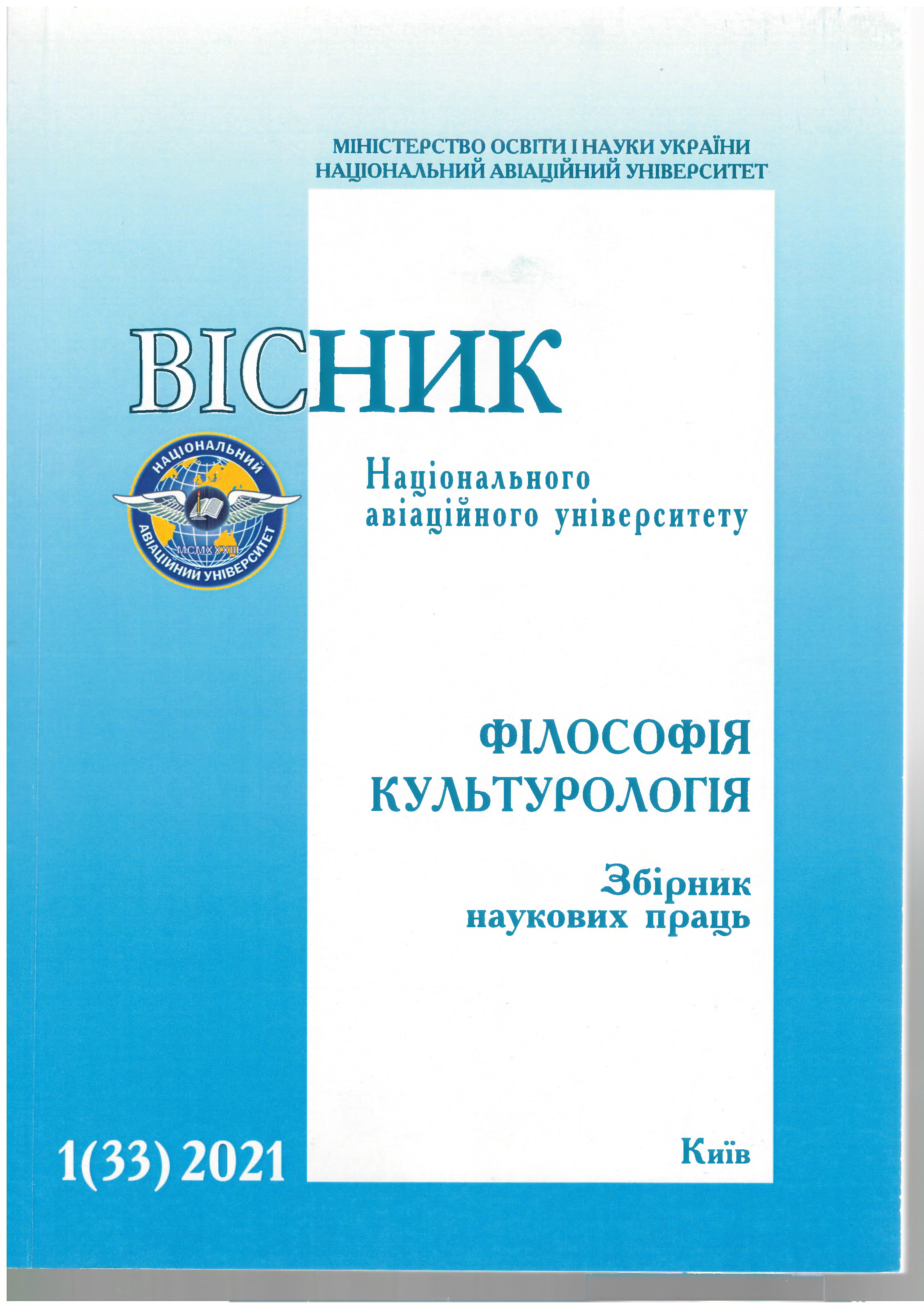PHILOSOPHICAL ANALYSIS OF THE DISCOURSE OF INFORMATION ETHICS AND ITS MORAL-PRACTICAL DILEMMAS
DOI:
https://doi.org/10.18372/2412-2157.33.15647Keywords:
information ethics, morality, computer ethics, information revolution, mediacracy, media communication, information culture, information and communication technologies, human rightsAbstract
Introduction. In the context of the information revolution of the last quarter of the XX century and the transition of most developed
societies from industrial to information stage, the problem of philosophical and ethical understanding of the new human situation has been actualized. The emergence of various types of applied and professional ethics has become a kind of response to this situation. Information ethics is one of these varieties. Research methods. The theory and method of discourse analysis, the method of comparative analysis, as well as system-logical, dialectic, analytical, synthetic and structural research methods are applied. The aim and tasks. The paper considers the features of information ethics. It analyses its ethical and practical nature, traces the history of its formation and designates the key moral and ethical, axiological, existential themes. Researchresults. Since the moment of informational transformations of society and the spiritual influence of postmodernism, the diversity of schools and approaches to the problems of ethics and morality has been characterized by pluralistic epistemology and ontological decentration. The possibilities of ethics as a moral philosophy are recognized as limited; therefore, a need for practical ethics arose. Applied ethics takes the role of a kind of methodology for making moral decisions in specific situations. Information ethics is a type of applied ethics and, first of all, is focused on the study of practices related to the functioning of information technology systems, world communication networks, in general, electronic culture. Its purpose is to solve dramatic, controversial, dilemma problems manifested in human relationships within information environment. Information ethics concerns not only ethical, but also social, legal and technical issues. The term "information ethics" first appeared in the library and information literature in the late 1980s, and in recent decades, it has been developing not only within, but also beyond the professional and scientific communities. Discussion. The different approaches tothe meaning of information ethics in the works of R. Capurro and L. Floridi is analyzed. R. Capurro, distinguishes the concept of "information ethics" from the close concept of "computer ethics. R. Capurro's “information ethics” acts as a generic concept, and is thought of as “the entire information and communication sphere.” L. Floridi views information ethics as an onto-centric environmental ethics; therefore, he shiftsethical regulation from society to
the sphere of animate and inanimate nature. The article also discusses the dilemmas of current topics of information ethics.
Conclusion. The changes associated with the rapid development of information and computer technologies not only open up enormous opportunities for humanity, but also cause the emergence of new ethical problems. Information ethics requires that the information society tobe based on the principles of mutual respect and respect for human rights.
References
Bynum, Terrell. Computer and Information Ethics // The
Stanford Encyclopedia of Philosophy (Summer 2018 Edition),
Edward N. Zalta (ed.), URL: https://plato.stanford.edu /archives
/sum2018/entries/ethics-computer/
Declaration of Principles. Building the Information Society:
a global challenge in the new Millennium // Document WSIS-
/GENEVA/DOC/4-E (12 December 2003) Original: English
URL: http://www.itu.int/net/wsis/docs/geneva/official/dop.html
Drotianko L., Abysova M. Communication in a globalized
multicultural society: ethnic mentality aspect // MATEC Web of
Conferences 170, 01019 (2018) SpbWOSCE-2017. 1-11.
Elrod Edwin M., Smith Martha M. Information Ethics //
Encyclopedia of Science, Technology, and Ethics. Encyclopedia.com.
(April 10, 2021). URL: https://www.encyclopedia.com/ science
/encyclopedias-almanacs-transcripts-and-maps/information-ethics
Floridi L. Foundations of Information Ethics // The Handbook of
Information and Computer Ethics / ed. by Kenneth Einar Himma and
Herman T. Tavani. Hoboken, New Jersey: Published by J. Wiley &
Sons, Inc., 2008. P. 3-24. URL: http://www.cems.uwe.ac.uk/~
pchatter/2011/pepi/The_Handbook_of_Information_and_Compute
r_Ethics.pdf (дата звернення: 14.10.2015)
Floridi L. The Philosophy of Information: Ten Years Later //
Metaphilosophy. Ed. By A.T. Marsoobian. Oxford, UK. Vol. 41, N.
, April 2010. Р. 420-442.
Mason, Richard; Florence Mason; and Mary Culnan.
(1995). Ethics Of Information Management. Thousand Oaks, CA:
Sage Publications.
Антіпова О . П . Т рансформація системи духовно-
інформаційних цінностей в умовах сучасної культурної доби /
О. П. Антіпова // Актуальні проблеми філософії та соціології.
Вип. 12. С. 8-12. URL: http://nbuv.gov.ua/ UJRN/aprfc
_2016_12_4
Апресян Р. Г. Этика и дискуссии об искусственном интеллекте
/ Р. Г. Апресян // XI международная конференция «Теоретическая и
прикладная этика: Традиции и перспективы – 2019. К грядущему
цифровому обществу. Опыт этического прогнозирования (100 лет со
дня рождения Д. Белла 1919-2019)». Материалы конференции. –
СПб.: ООО «Сборка», 2019. – С. 169-170.
Гусейнов А. А. Размышления о прикладной этике /
А. А. Гусейнов // Ведомости Научно-исследовательского
Института прикладной этики. Вып. 25: Профессиональная этика.
Тюмень: НИИПЭ, 2004. – С. 148-159. URL: https://iphras.ru/
uplfile/ethics /RC/ ed/kaunas/gus.html
Донец О. В. Информационная этика как онтоцентри-ческая
экологическая макроэтика в философии информации Лучано
Флориди / О. В. Донец, О. П. Черных // Исторические,
философские, политические и юридические науки, культурология
и искусствоведение. Вопросы теории и практики. Тамбов, 2015. №
Ч. 1. 88-90. URL: https://www.gramota.net/ articles/issn_1997-
X_2015_12-1_20.pdf
Капурро Р. Информационная этика / Рафаэль Капурро
// Информационное общество, 2010. Вып. 5. С. 6-15.
URL:http://emag.iis.ru/arc/infosoc/emag.nsf/BPA/7c972fbe98fca1
c32577dc0036bb4f
Киссинджер Г. Мировой порядок / Генри Киссинджер.
М: АСТ, 2015.544 с.
Кутырев В. А. Философия постмодернизма: Научно-
образовательное пособие для магистров и аспирантов
гуманитарных специальностей / В. А. Кутырев. – Нижний
Новгород: Изд-во Волго-Вятской академии государственной
службы, 2006. – 95 с.
Скиба О. П. Інформаційні технології: соціально-
філософський аспект / О. П. Скиба // Вісник Національного
авіаційного університету. Філософія. Культурологія. 2020. №
(32). – С. 51-56.

